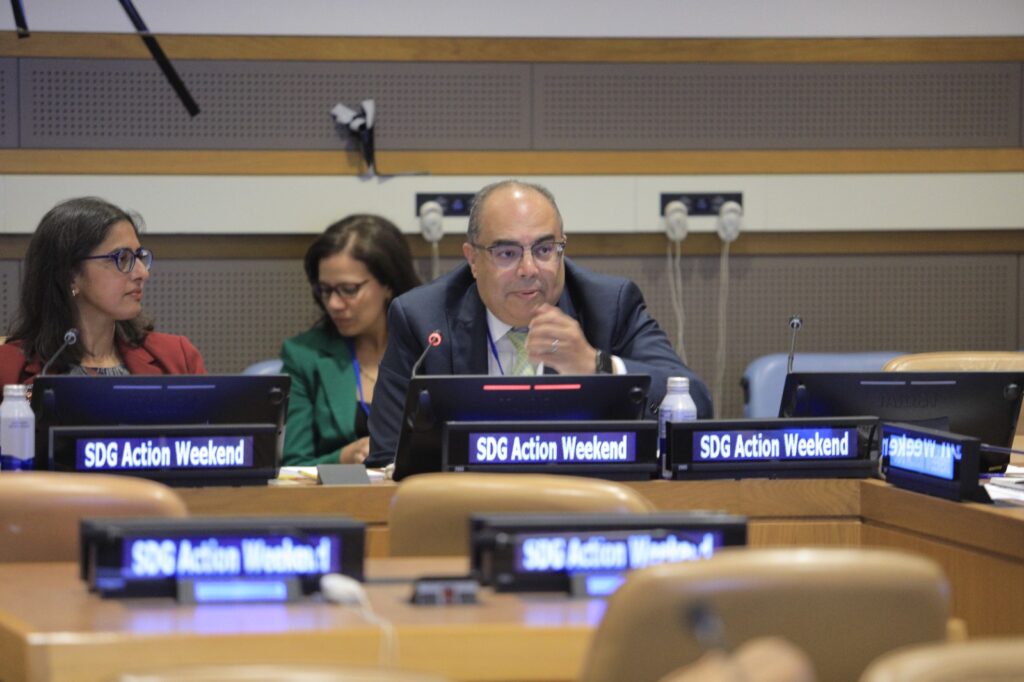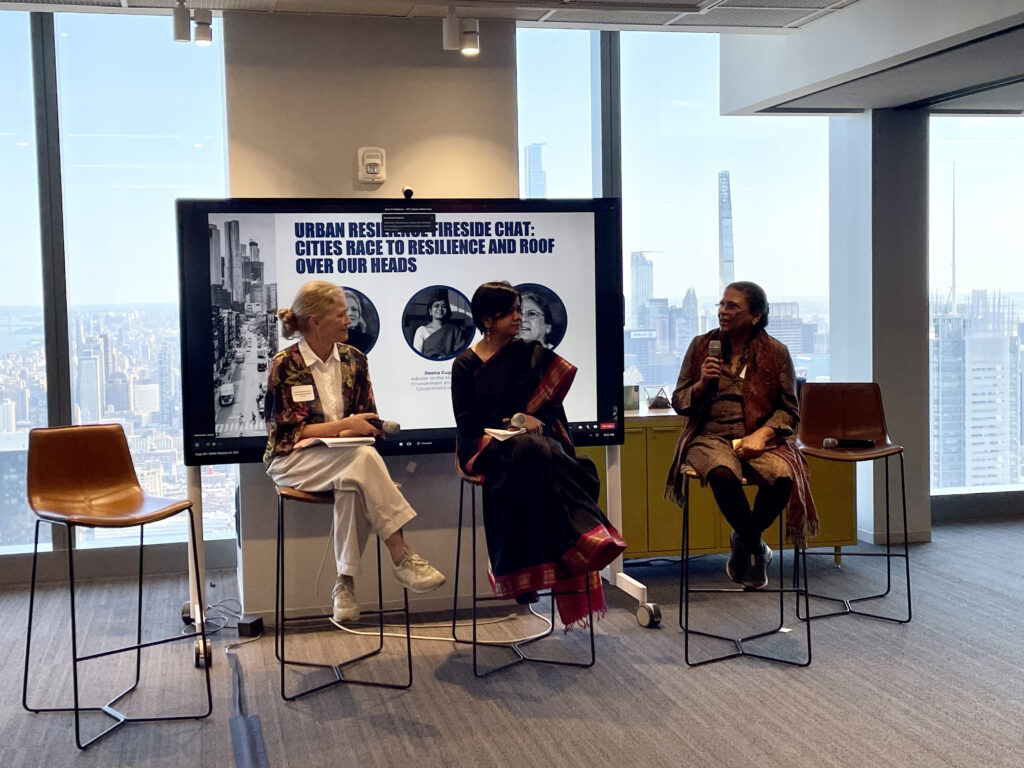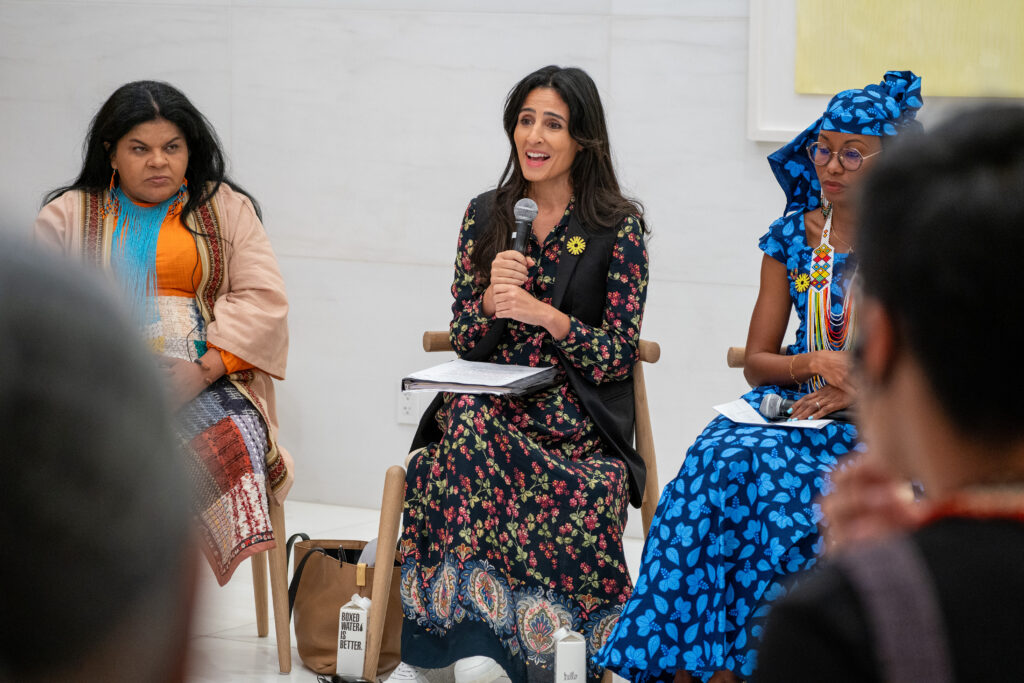Feike Sijbesma on inspiring ‘fence sitters’ to become climate leaders
High-Level Champions Global Ambassador, Feike Sijbesma and co-chair of the Global Center on Climate Adaptation (GCA) explains how to shape a transformation mindset.
Climate Week New York City has come to a close, with the UN Climate Change High-Level Champions calling for private finance to be unlocked for nature-based solutions and spotlighting the ‘Regional Platforms for Climate Projects’ – evidence that just, affordable and accessible climate finance is paramount to the achievement of the Sustainable Development Goals.
The annual climate gathering ran from 17 – 24 September this year. Taking place in parallel to the UN General Assembly, Climate Week NYC events united business leaders, political change makers and civil society representatives from all over the world to drive the transition towards science-based climate targets and showcase the promising progress that is already taking place.
The High-Level Champions’ programme covered a range of critical themes – from decarbonization to adaptation, from resilience to loss and damage, as well as the urgent need to accelerate climate financing and the central role of nature, youth and indigenous peoples in tackling climate change.
Highlights of the week included: taking stock of progress achieved in operationalizing the Sharm El-Sheikh Adaptation Agenda; the launch of the Insurance Adaptation Acceleration Initiative; Race to Resilience and Race to Zero members raising their voices at the UN Climate Ambition Summit; Delhi becoming the 84th city to join the Race to Resilience; major developments for the Mangrove Breakthrough with support from the UAE and Salesforce; a Google innovation sprint to design solutions to address climate risks; and meetings with Indigenous Peoples to drive meaningful inclusion at COP28. It also included three calls to action from the High-Level Champions on transforming our food systems; driving private capital investments in nature-based solutions; and integration of the banking sector in climate finance solutions.
A solutions-driven approach
During the official opening ceremony organized by the Climate Group, H.E. Razan Al Mubarak, UN Climate Change High-Level Champion for COP28 highlighted the significance of the upcoming climate conference in Dubai, host to the first Global Stocktake of the Paris Agreement. “Although we are far off target, we know of solutions that will rapidly help close gaps. This needs to be captured at COP28 to send a powerful, clear political and market signal to the world,” H.E. Al Mubarak said. “With partnership and science we have identified the key levers of change, and nature will play a central role given it also supports the most vulnerable of populations.”
Dr. Mohieldin, UN Climate Change High Level Champion for COP27, add to this: “The failure to achieve global climate action is because we are deviating from targets. The UN Secretary-General warned us against shady pledges but non-State actors are advancing actions on mitigation, adaptation and loss and damage despite countries suffering from geopolitical tensions.”
Finance and technology as key enablers
Convening a side event on ‘Regional Platforms for Climate Projects’ at the UN’s Sustainable Development Goals Action Weekend, Mohieldin spoke about building an impactful climate finance marketplace. Here he emphasized the need for concessional finance and de-risking to boost investments in developing countries. During a roundtable meeting on Mobilizing Private Climate Finance in emerging markets and developing countries, he highlighted the importance of new policies for concessional finance, lower interest rates, and extended repayment periods. Activating credit guarantee mechanisms and improving the regulatory environments will encourage private sector participation in climate action, he stressed. Furthermore, he discussed the High-Level Champions’ incoming paper on financing climate action in Africa and highlighted the success of the five Regional Finance Forums with the UN’s Regional Economic Commissions in identifying climate projects and securing deals with potential financiers.

(Dr. Mohieldin (centre) speaking at the SDG Action Weekend)
During a meeting with Net Zero Banking Alliance (NZBA) members, Mohieldin discussed the banking sector’s important role in transitioning to a net-zero future. As part of the Race to Zero, these banks are committed climate actors within the finance sector but “should play a bigger role in transitioning towards green economies by investing in climate projects”, said Mohieldin. He also stressed that banks’ commitment to net zero would impact economies and engage customers in emissions reduction efforts. He noted that banks are increasingly integrating climate action into their strategies and highlighted the important and urgent role they must play to mobilize climate finance. He also emphasized the importance of digitalization and artificial intelligence in advancing climate action in the Arab region, citing Egypt’s National Initiative for Smart Green Projects as a model for using technology in environmental and climate projects.
In particular, Taskforce on Nature-related Financial Disclosures’ (TNFD) recommendations mark a significant step in linking nature, business, and financial capital by recognizing the risks of accelerating nature loss. The 14 recommended disclosures and implementation guidance attracted early adopters like GSK, with more corporates expected to join soon.
Non-state actors driving change
Non-State actor leadership and action is critically important but the UN Climate Change High-Level Champions recognise that voluntary commitments will only go so far, and are still not translating into the scale of real emissions reductions and resilience we need. This is why from Nairobi to New York, they are calling on policymakers to race to set regulations and socio-economic incentives that promote rigorous and immediate action to halve global emissions by 2030. Leading corporates must also align their policy engagement with their climate targets. Just before New York Climate Week InfluenceMap released a list highlighting 27 multinationals (many of whom are also in the Race to Zero) who are leading in that regard.
During New York Climate Week, Mayors emphasised their work driving the implementation of, for example, clean energy systems and building resilience for their communities. With 1,147 City members in the Race to Zero, and 84 in the Race to Resilience, Mayors are showing the way forward. Attending the High-Level Champions event on Wednesday, the City of Delhi announced it had joined the Race to Resilience campaign unveiling its plans for a circular economy approach to its waste management, investing in renewables such as solar and electric vehicles, and aiming for 25% green cover for its 30 million inhabitants.
Google and the High-Level Champions collaborated to design a data platform addressing climate hazards for local adaptation solutions. They focused on breaking data silos, making climate information accessible to frontline communities, and mobilizing finance for resilience, with a particular emphasis on the global south and partnerships with Race to Resilience.
Protecting nature integral to tackling climate change


(From left to right: Emma Howard Boyd, Reena Gupta and Sheela Patel speaking on implementing urban resilience actions aligned with the Sharm El-Sheikh Adaptation Agenda)
Speaking at the Nature Positive Hub, Al Mubarak argued that nature is vital for the success of the Paris Agreement. Specifically, nature-based solutions can address over one-third of climate mitigation needs by 2030 and boost adaptation efforts and economies. To achieve this, aligning financial systems with a nature-focused global economy is essential. The private sector, through innovation and investment, is central to closing the financing gap by 2030. Collaboration among governments, investors, businesses, and civil society is crucial to integrate nature-based solutions into climate strategies and acknowledge and include the leadership of Indigenous Peoples and Local Communities in climate action.
As mentioned in the High-Level Champions’ new report, a $10 trillion opportunity lies in nature-positive business models that align with net-zero and nature-positive goals, requiring innovation, replication, and collaboration, with the private sector at the forefront. Urgent regulatory strengthening and enhanced public finance actions are essential, focusing on science-based frameworks, adaptation integration, technology utilization, scaling initiatives, collaboration, and knowledge sharing to maximize impact and scalability.
Under the leadership of H.E. Razan Al Mubarak, the High-Level Champions have set a global target to restore mangroves, a key solution for building climate resilience in coastal areas. At Climate Week New York, Race to Zero member Salesforce committed $8.3M for climate justice and nature action, including support for the Mangrove Breakthrough. This will help us get one step further to securing our ambition to invest USD 4 billion to halt loss, restore half, double protection of 15 millions hectares of mangroves by 2030.
H.E. Mariam Almheiri, UAE’s Minister of Climate Change & Environment, endorsed the Mangrove Breakthrough initiative and invited other countries to do so, announcing COP28 will host a Ministerial event on its Oceans Day (9th December 2023), to finance local mangrove restoration and conservation projects that help coastal communities build resilience to climate change. In the announcement, H.E. Ms. Al Mubarak said: “With coastal ecosystems already facing the impacts of a changing climate, we urgently need to scale up action to conserve, restore and protect mangroves. COP28 will provide a valuable opportunity to amplify the Mangrove Breakthrough’s goals and place nature at the very heart of the climate agenda.”
Food is also a source of connection, linking us to nature, communities, and cherished traditions. However, in her article, H.E. Razan Al Mubarak, poignantly highlights the paradox that our current food systems, while feeding us, also contribute to environmental harm, including emissions, deforestation, and biodiversity loss. “The good news? We know what needs to be done to transform food systems to deliver for people, climate, and the planet”, she said. Her hopeful message underscored that we have the knowledge (a lot of which is indigenous) and tools to transition to nature-friendly agricultural practices, promote healthier diets, reduce food waste, and protect and restore our natural resources. In New York, she passionately called on all stakeholders to intensify their efforts on food systems. With COP28 on the horizon, she urged all actors to take action now to create a world where sustainable, nature-friendly food systems flourish.
Meaningful inclusion central to effective climate action

(From left to right: Minister Sonia Guajajara, H.E. Razan Al Mubarak, Hindou Oumarou Ibrahim during the UNPFII dialogue)
Following up on April’s discussions at the UN’s Permanent Forum on Indigenous Issues (UNPFII), Al Mubarak met with forum members to discuss the progress on meaningful inclusion and engagement of Indigenous values and knowledge systems at COP28. “I’ve always been guided by the purity of intention and compassion in life, and I am channeling this to push us through a very complex process. Indigenous issues should no longer be permanent but part of the solution”, she said.
The High-Level Champion emphasized the need to balance market principles with nature conservation, and highlighted three gaps: participation across seven socio-cultural regions for all generations; visibility with a historical first programmed day for Indigenous Peoples at COP28; and direct financing that reaches communities quickly and efficiently. Various Indigenous speakers advocated for greater youth involvement and the UNPFII Chair noted the importance of understanding their languages and cultural context in climate finance negotiations.
The forum also welcomed Sonia Guajajara, Brazil’s first ever Minister for Indigenous Peoples, who called for an executive working group to rigorously funnel these actions through to COP30.
H.E. Razan Al Mubarak is also enhancing gender inclusivity, with a focus on empowering women and girls in climate action. COP28 will include a Women and Gender Pavilion, curating women-led solutions and dialogues. “There is ample evidence that shows us how climate amplifies existing gender inequalities and poses unique threats to the livelihoods, health, and safety of women and girls. At the same time, women are often frontline responders to climate stresses and disasters – and leaders in finding solutions and building climate ambition”, she said.
Race to Zero ‘trailblazers’ highlighted
The United Nations Secretary-General’s Climate Ambition Summit showcased “first movers and doers” responding to the call for accelerated climate action. All the business, finance, city and subnational government leaders that spoke at the event are members of Race to Zero partner initiatives.
Since its inception in 2019, Race to Zero has firmly established a high ambition and credible net zero standard for non-State actors. The surging pledges, which stand at a strong and growing group of 12,500 members, have sent a resounding message to governments that the commitment to decarbonise our world by 2050 remains critical.
With the UN’s regional climate week for the MENA region on the horizon, Dubai’s The Surpluss has joined as the first UAE-based ‘Accelerator’ for the Race to Zero during Climate Week New York, and one of only 29 organizations worldwide with this designation. Committed to the Paris Agreement’s goals, The Surpluss will assist 500 UAE-based companies in reducing emissions by 2030 and fully decarbonising by 2050. They also focus on supporting small businesses and aim to create more inclusive and resilient economies through global collaboration. Monthly on-boarding events will help companies start their climate commitments towards COP28 in Dubai from 30 November – 12 December this year.
The road to Dubai
Looking ahead, the High-Level Champions will be convening actors at the UN’s Regional Climate Weeks for the Middle East & North Africa (Riyadh, 8-12 October) and, Latin America and the Caribbean (Panama City, 23-27 October) and Asia-Pacific (Johor Bahru, 13-17 November). Focused on delivering a holistic, system-wide transformation, the meetings will aim to bolster efforts in advance of COP28 in Dubai and the inaugural Global Stocktake, which plays a pivotal role in advancing the objectives of the Paris Agreement.
High-Level Champions Global Ambassador, Feike Sijbesma and co-chair of the Global Center on Climate Adaptation (GCA) explains how to shape a transformation mindset.
Banking sector must play bigger role in transitioning towards green economy and achieving climate change adaptation, says UN Climate Change High-Level Champion for COP27.